General Insurance Blogs, Articles & Updates by - Magma HDI
Have us call you
- RENEW YOUR POLICY
- BUY NEW POLICY
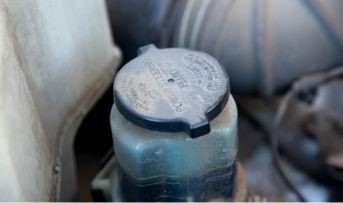
What does the power steering alert on the car dashboard indicate
If you've driven a car with manual steering, you must know how difficult it can be. Power steering is an advanced mechanical device fitted in your vehicle that helps you turn the steering wheels effortlessly.
But very few car drivers know the significance of warning lights appearing on the dashboard. When the warning light for the power steering system in your automobile comes on, you should be concerned since that usually means the power steering system is broken, making it extremely difficult to drive the vehicle.
What turns on the power steering light?
Low fluid level is the most frequent cause of the power steering warning light for vehicles with hydraulic power steering. A leak in one of the tubes can be a primary reason. When your power steering light turns on while driving, it'll be wise to slow down and park your car safely. Just be extremely careful because your steering will be considerably heavier at this point.
Open the bonnet to find the reservoir for the steering wheel fluid. There might be a picture of a steering wheel on the reservoir cap. If not, refer to your owner's manual to locate it.
Examine the liquid level. Before continuing your journey, you should top off the reservoir if it appears to be getting low. If you likely don't have any, visit your neighbourhood car service centre to buy some.
Start your engine after topping off the power steering fluid. You may continue travelling if the warning light doesn't turn on again. If the power steering light is still on, there may be a more significant issue. You should get your vehicle checked at a nearby garage or service centre to inspect the actual problem.
What if an EPS light appears?
Cars without hydraulic power steering will activate the EPS system, which stands for electronic power steering. If your car's EPS warning light glows, diagnosing the problem could be more difficult because there won't be any fluid levels to examine. You should carefully check all the connections to the battery for signs of wear or damage because a problem with the battery or alternator could sometimes cause it.
You may also have a problem with the EPS light if you recently had to jumpstart your car or take the battery out. Sometimes you might resolve the issue by turning your car on and off again. Even if this works, you should still have your car checked at a service centre because there might be a deeper problem.
Driving while the power steering light is on, is it safe?
It won't be simple because turning will be more challenging, and steering will be heavier. Accidents will also be far more likely because it will be nearly impossible to react to situations at higher speeds. If the light turns on while you're driving, it'll be better to inspect your car in a secure location before heading further.
Either way, the steering wheel warning light could mean something is wrong with your power steering system. It would help if you had a trained mechanic checking your car to address the issue.
Car insurance can financially aid you if the damage is severe and requires high repair costs. Every car insurance policy has an annual renewal period. Policyholders must do their renewal promptly to continue using the vehicle insurance services. If they fail, their policy coverage may lapse, and they may lose all the benefits and policy coverage. Always look out for updates in the car insurance price in India and plan your policy renewal accordingly.
Click HERE to buy a comprehensive car insurance policy.
Disclaimer: The information provided above is for illustrative purposes only. To get more details, please refer to policy wordings and prospectus before purchasing a policy.
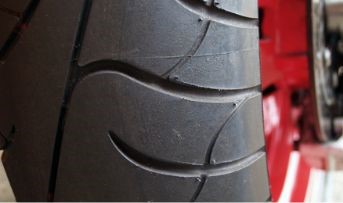
Keep these tips in mind when buying motorcycle tyres
As a motorcycle rider, ensuring your bike's safety is paramount. One critical aspect of ensuring safety has the proper tyre set on your bike. The tyres play a significant role in the overall performance and handling of the motorcycle.
In this blog post, we will share some tips on what to remember when buying motorcycle tyres, including the importance of having 2 wheeler insurance online for additional safety. Keep these tips in mind when buying motorcycle tyres. So, without any further delay, let's get started!
1. Choose the right size
When it comes to buying motorcycle tyres, size matters. Ensure you get the right size of tyres for your bike to ensure maximum safety and performance. The size of the tyre is indicated on the sidewall of the tyre and will include information such as the width, aspect ratio, and rim size.
Choosing the right size will provide better handling and stability, especially at high speeds. It is important to note that changing the size of the tyres from the manufacturer's recommended size can adversely affect the bike's performance.
2. Consider the type of tyre
Different types of tyres are designed to perform in different ways. The two main types of tyres are bias-ply and radial tyres. Bias-ply tyres are made with a layered construction of nylon and rubber, providing better durability. In contrast, radial tyres have a steel belt construction, providing better handling and performance at higher speeds.
The type of tyre you choose will depend on your riding style and conditions. For example, if you ride in wet conditions, you may consider getting tyres with better grip and water dispersal capabilities.
3. Check the tyre tread
The tread on the tyre is vital in providing traction and grip on the road. It is essential to check the tread depth regularly and replace the tyres when the tread is worn out. A worn-out tread reduces the tyre's grip on the road, making it more prone to slipping and sliding.
When checking the tread depth, ensure it meets the minimum legal requirements. In India, the legal limit for tyre tread depth is 1.6mm. However, tyres with a tread depth of 3mm are recommended to ensure maximum safety.
4. Consider the brand and quality
When buying motorcycle tyres, it's essential to consider the brand reputation and quality. Opt for trusted brands that are known for producing high-quality tyres. Quality tyres ensure better performance and a longer lifespan, saving you more money in the long run.
5. Check the load and speed ratings
Before purchasing motorcycle tyres, checking the load and speed ratings is crucial. These ratings indicate the maximum load capacity and speed the tyre can handle. Ensure you choose tyres matching your motorcycle's load and speed requirements for optimal performance and safety.
6. Don't compromise on safety for price
While staying within your budget is essential, it's equally important not to compromise on safety for price. Cheap tyres may seem cost-effective, but they often lack the grip and durability for safe riding. Invest in quality tyres designed to provide maximum safety on the road.
Buying the right motorcycle tyres ensures a safe and comfortable ride. Remember the tips mentioned above when purchasing. In addition to purchasing high-quality motorcycle tyres, you must protect yourself and your bike with 2 wheeler insurance online which can cover damages caused by accidents, theft, and natural disasters. It's a wise investment that can give you peace of mind while riding your motorcycle.
Click HERE to learn more about the benefits of purchasing 2 wheeler insurance online.
Disclaimer: The information provided above is for illustrative purposes only. To get more details, please refer to policy wordings and prospectus before purchasing a policy.
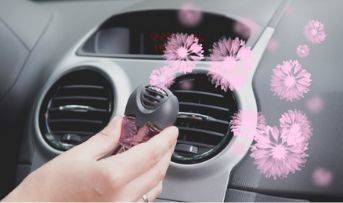
Keep your car smelling fresh with these practical hacks
Buying a car is a significant investment for most Indians. It is a dream that cultivates in the minds of the young and is seen as no less than a requirement alongside essentials like a home. After such heavy capital expenditure, it becomes a necessity for every car owner to maintain their vehicle diligently. This may be through careful use, regular servicing, and availing of online car insurance renewal facilities.
Regular exterior maintenance of the car is required to keep it shiny and in good working condition. But what about the interiors? Daily car users face the common issue of stinking interiors for various reasons. Consistent negligence can make your car smell terrible, resulting in an unpleasant driving experience.
How can you overcome this problem? Use these simple methods to ensure that your car smells good.
1. Use baking soda and vacuum frequently
Routine vacuuming your automobile can help keep your car clean, look appealing, and lessen odours. If smells are very potent or persistent, sprinkle the baking soda on the stinking area. Let the surface dry for some time, then vacuum the baking powder.
2. Fabric fresheners and dryer sheets
To refresh the air, hang some dryer sheets on the air conditioner's vents. The sheets will serve as a deodoriser for the vehicle. They will last longer than typical vehicle fresheners when placed on A/C vents. Alternatively, you can create air fresheners by placing deodoriser pods in mesh bags or mason jars with holes in the lid.
3. Freshen up your floor mats
Another spot that may be challenging to maintain is the floor mats, particularly if you have children or dogs. The easiest way to keep the mats fresh is to frequently vacuum them and use baking soda or a carpet refresher to absorb odours.
An alternate choice is a car air freshener, which typically has a pleasant perfume to cover up any odours in your car. However, it may not be the best option if you're attempting to avoid drawing more dust particles in your vehicle. You should also consider installing a charcoal air filter to defend against the stench.
4. Coffee beans
Coffee beans are one of the most potent fragrances for a vehicle freshener. Place some beans in a tiny paper bag, sock, or small mesh bag under the seats. You may also use ground coffee, but do it in stable containers, such as a salt shaker, so you won't need additional cleaning in case they spill. Position it in a regular location, such as the cup holder.
5. Essential oils
A drop or two of essential oils can make your vehicle smell magical. Put this on the console for immediate car aromatherapy if you already have a diffuser. You can utilise variations such as peppermint to prevent nausea or motion sickness when you have sensitive passengers.
6. Diluted shampoo spritz
Avoid washing your dashboard or doors with chemicals that contain alcohol or ammonia, as these might damage the materials. Instead, use a spray bottle to apply a 4-to-1 diluted solution of warm water and mild shampoo on a soft microfiber cloth.
Proper upkeep and accessories are essential for maintaining the appeal of your vehicle, whether it is new or used. Unpleasant odours can be challenging and embarrassing if left to persist for long periods. Like the exteriors, your leather seats and sophisticated cabin interiors deserve appropriate care. Similar to online car insurance renewal services that prevent the burden of potential mishaps, we recommend regular cleaning and using air fresheners to prevent stale air and stenches inside the car cabin.
Click HERE to know more about car insurance renewal.
Disclaimer: The information provided above is for illustrative purposes only. To get more details, please refer to policy wordings and prospectus before purchasing a policy.
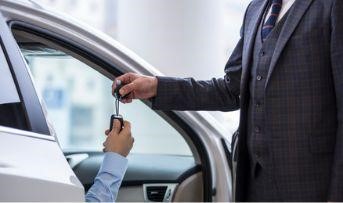
What is hypothecation in car insurance, and how to terminate it
Cars are becoming trendier and feature-rich day by day, and the young generation is not satisfied by owning just one car. The craze for cars is ever-increasing, with multiple cars in every household becoming a common sight. The demand for car loans has seen a robust increase in the last few years, thanks to easy EMIs or monthly installments.
Generally, a car loan is available for a flexible tenure, and technically, the bank or financer remains the vehicle owner until the entire loan is paid back.
What is Hypothecation of a car?
Hypothecation is pledging any asset, such as a car, as collateral with a bank or a financial institution in exchange for a loan. When you take a loan from a financial institution to buy a car, you hypothecate your vehicle as collateral or security with that financial institution in exchange for the loan it provides. There is no transfer of title to the bank, and you continue to be the actual owner of the car.
However, the bank will have the right to take your car from you if you miss the EMI payment schedule and fail to pay the loan amount back to the bank. When we hypothecate our car with the bank, it gets mentioned in our vehicle RC (Registration Certificate) and car insurance policy.
How to eliminate hypothecation?
1. Pay off the car loan:
The first step in removing the hypothecation is to pay off the entire loan amount and not just a part of it.
2. Approach your bank:
Once you have paid the car loan amount in full, approach your lending bank and inform it about the same. It will check and issue you a NOC (No-Objection certificate) certifying that you have paid off the loan amount.
3. Go to the RTO:
You must submit the NOC to your concerned RTO (Regional Transport Office). You will also have to submit your car's original RC (Registration Certificate) along with a few other documents, such as your current insurance policy papers and No-pollution certificate.
4. Removal of hypothecation from the RC:
The RTO will then remove the hypothecation clause of your car from the original RC and issue you a new RC. This process usually takes around 5-7 working days.
5. Removal of hypothecation from the insurance policy:
You have to submit the NOC from your bank to the insurance company and terminate the hypothecation clause from your motor insurance India policy.
Why do we need to terminate the hypothecation of our car?
It is very important to terminate the hypothecation of your car once you have repaid your car loan in full. Till the time it is mentioned in your car RC that it is hypothecated to a so-and-so bank, you are not the true owner of the car in the real sense. Your car is still acting as collateral with that bank.
This implies that you cannot sell your car until and unless you remove the hypothecation clause from your RC and insurance policy. Taking a car loan to buy your dream car is a good option as it removes the burden of paying the full amount of the car in one go. You can easily pay some down payment and the rest of the amount in EMIs.
But just buying a car is not enough. You must also have a valid motor insurance India policy as long as you own the car. The motor insurance law in India makes it compulsory. Also, you have to renew it every year. This will ensure your car is protected and secure under your insurance service provider, and you can relax and stay tension-free.
Click HERE to buy motor insurance India.
Disclaimer: The information provided above is for illustrative purposes only. To get more details, please refer to policy wordings and prospectus before purchasing a policy.
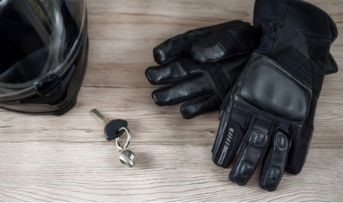
What is the no-objection certificate for bikes, and how to apply for it
Suppose a bike owner plans to sell his bike or move with the bike to a new city. In this case, a NOC, or no objection certificate, is required to avoid legal issues.
A letter known as a NOC, or No Objection Certificate, must be issued to sell your bike. Even if you are relocating to a new city, a NOC must be given to register your bike in the new location. The NOC is also required if a sold bike is to be registered in the name of the new owner.
How is NOC applied for a bike?
You must, under government regulation, receive a NOC from the RTO to validate your deregistration from that RTO. Without further ado, let's discuss the process for requesting a NOC certificate for a bike.
Here is a step-by-step instruction sheet for requesting a NOC for a bike when crossing state boundaries and intending to stay there for more than a year:
● To obtain a NOC, prepare an application and send it to the transport bureau in your area
● Fill up Forms 27 and 28 correctly, then submit them to the RTO
● If your vehicle was purchased using a loan or EMIs, get a NOC from the lender
You can expedite the procedure by obtaining NOC from the traffic department and your local police station in addition to following these steps.
You must submit an application letter explaining your relocation plans and supporting documentation to your financier or bank to get their no-objection certificate (NOC). These could be an appointment letter, a job transfer letter, housing documentation for the new location, etc.
What factors are to be considered while applying NOC for a bike?
For a hassle-free process, consider the following aspects before you apply for the NOC for your bike:
● Authenticate the copies of the insurance policy and registration document for the bike
● Verify that the road tax is fully paid
● Ensure all of your information is accurate, especially the information in the application, along with the updated address
● Submit all corroborating documentation
● Make sure you have the confirmation of payment for the NOC application cost received through the Vahan Citizen Services website
Documents required to get NOC for a bike.
The following list of documents must be sent to the RTO to obtain bike re-registration or transfer bike ownership:
● Motorcycle registration certificate
● Form 28
● Bike insurance copy
● Road tax receipt
● Certification for pollution control (PUC)
● Numbers for your bike's engine and chassis
● Signature recognition
The following documents are required if you want to obtain a NOC from the bank:
● The loan documents
● Bike registration document
● Other documents that the bank may request
The NOC is, therefore, a legally required document that must be obtained for various reasons when dealing with bikes. Along with the NOC, don't forget to buy bike insurance online to safeguard your valuable asset when you move to another state. Buying a robust insurance policy online will help you enjoy several features and financial benefits that can aid you in recovering from loss due to damages.
Click HERE to buy bike insurance online and get exciting benefits.
Disclaimer: The information provided above is for illustrative purposes only. To get more details, please refer to policy wordings and prospectus before purchasing a policy.

Beginners guide to learn jumping rope at home
Physical exercise is one of the basic requirements for a healthy and functional body. A few minutes of physical exercise, when combined with a balanced lifestyle, can give tremendous results to keep your body in the best shape.
It would be best if you also take a balanced diet to maintain all the nutrients and vitamins in your body. Also, try practising mindful activities like yoga and meditation regularly can be a good booster for your mental health. Physical exercises can range from walking, swimming, jogging, and cycling, to trekking and even rope jumping.
Jumping rope is one of the easiest and most convenient ways to lose extra calories and stay physically active. If you're a beginner at jumping rope, this article is just for you. We will cover all the essential points that should be kept in mind before you start jumping rope at home. It is a brisk and healthy exercise for your mind and body.
Let's look at the basic requirements for jumping rope at home without further ado.
1. Choose the best rope:
You must choose a comfortable, lengthy, and sturdy rope for your exercise. For beginners, a light weighted rope with comfortable foam grips is highly durable and flexible.
2. Pick a suitable surface:
If you want a comfortable surface for jumping rope, you should choose a mat or a smooth indoor surface. If it still does not work for you, please go outdoors and find hardwood floors if possible.
3. Start with basic jumps:
Start by learning to hold the rope properly. Do not grip the rope too tightly. Make sure you hold it loosely with your fingers instead of your palms. With a loose grip, the rope will turn quickly and steadily without any extra effort from your side. Make sure to hold the rope close to your body for a rhythmic spin.
4. Focus on movements:
After you have mastered your grip, you should focus on the movements of your body. You can start by placing the rope behind you. Turn it over your head and catch it under your feet. Make sure that you practise it until you've mastered it. Keep pushing yourself till you perfect the skill.
5. Keep on practising:
Although it may look complex, you should take the first step and do it. Be very gentle with yourself. Do it slowly as you get a grip on the process. Start with five jumps and increase the counts every day. Try to beat your record every day and reward yourself with positive affirmations.
Mistakes to avoid.
The things that you should avoid when you jump rope are:
● Do not jump too high:
It is one of the most frequently committed mistakes by beginners. If you think jumping too high will reduce more calories, you're wrong. On the contrary, it puts you at risk of developing a sprain. You do not have to take giant leaps, but you can jump just some inch off the ground.
● Not jumping upright:
It is always recommended to jump upright or in an erect position. Do not jump with a hunched back. If you hunch your shoulders, the jump will not be proper, and you can also develop a bad body posture. Later, you may also experience back pain.
These things should be considered before you commit to jumping rope at home. It would help if you were very careful when starting a new physical exercise. Make sure that your body is comfortable with the exercise. Regardless, opt for the best personal accident insurance policy in India to avoid problems later.
Click HERE to purchase the best personal accident insurance policy in India.
Disclaimer: The information provided above is for illustrative purposes only. To get more details, please refer to policy wordings and prospectus before purchasing a policy.

Look for these features in a cruiser motorcycle as a beginner
Riding a motorcycle offers an adrenaline thrill that no other commute mode can provide. Commonly associated with feelings of freedom and adventure, motorcyclists often experience euphoric joy while steering their ride. However, the biggest concern with riding bikes is the safety features that can protect the riders in an accident. Despite manufacturers constantly rolling out new features that enhance rider protection, one must use other modes to ensure safety, including two wheeler insurance India.
Among all the bike categories, the cruiser bikes market share in India is significantly increasing. These incredibly stylish bikes are equipped with cutting-edge technology like infotainment, navigation, and many other features.
Here are some standard features to expect when purchasing a cruiser motorcycle.
1. Seat height
The most challenging issue that beginners have with two-wheelers is maintaining balance. Sitting upright in a relaxed position is critical to stabilising the bike. If your balance falters, you can place your feet on the ground to regain control over the motorcycle. For this purpose, low seat height is essential for easy ground access.
2. Comfort-centric riding ergonomics
The rider’s posture is crucial to ensure proper balance and prevent accidents. Sports or commuter bikes allow room for tense posture that can harm the rider in the long run. Cruisers have a design that facilitates a relaxed sitting stance on an amply cushioned seat. This promotes good riding posture and makes for comfortable long-distance rides.
3. Sound engine
Cruisers are often considered to have low-power engines that offer inefficient acceleration. However, they are not far behind the power and capacity of commuter bikes. While you cannot expect the high speeds that sports bikes offer, cruisers provide adequate power for both short rides and long highway adventure trips.
4. Comfortable pegs
Most motorcycle designs leave riders with insufficient space to position their feet, resulting in uncomfortable long rides. The peg positioning in cruisers allows stretching of the legs compared to the normal riding posture in commuter bikes. You do not require additional highway footpegs to increase room for efficient leg positioning. Ensure you take a test ride on the bike before purchasing to get used to the positioning. Ideally, your midfoot should rest on the pegs. Your knees do not cross the peg, thereby preventing muscle strain.
5. Storage saddlebags
For frequent riders, it is inevitable to travel with baggage. Cruisers come with additional storage space in the form of saddlebags and extra luggage capacity in the rear. This greatly helps reduce distractions while riding. The bike’s build also allows greater room to attach other travel accessories, making for a great long-distance ride.
6. Chassis weight
Cruisers often have a heavy design that weighs them down, requiring riders to have adequate physical build to manage the bike's weight. This is a boon and bane. Positively, it slows down the vehicle and minimises the risk of accidents, but as a con, it requires additional effort to manoeuvre the bike single-handedly. However, this makes it among the safest bikes to ride. Supplementing it with two wheeler insurance India goes a long way in amping up the rider's protection.
Before purchasing a cruiser, ensure to go on a test ride to evaluate its weight and your ability to manage it.
Careful evaluation of a bike's mechanical features and safety provisions is necessary irrespective of its type. While beginners may find cruisers comfortable, safe, and suitable for long rides, one must always purchase two wheeler insurance India to stay protected against the allied financial costs of accidents.
Two wheeler insurance India is a mandatory requirement that ensures financial protection against accidents that every bike owner must prioritise.
Click HERE to buy two wheeler insurance India policy.
Disclaimer: The information provided above is for illustrative purposes only. To get more details, please refer to policy wordings and prospectus before purchasing a policy.
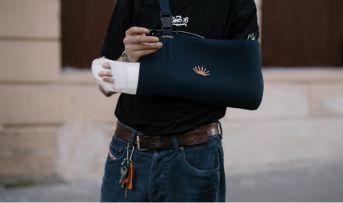
Best tips to do daily tasks with convenience after a fracture
A fracture brings pain and many inconveniences while performing your daily routine tasks. You have to start doing things differently and take help from others to finish your work. A fracture is different from a regular cold or fever, which is cured in just a few days. A normal fracture takes at least 20-25 days to heal, and more complex ones can take several months before you return to normal routine.
Hence, a fracture can be very troublesome if you do not handle it properly. Here are the best tips to do daily tasks conveniently after a fracture.
1. Simplify your daily tasks:
The first thing you should do after suffering from a fracture is to simplify your daily tasks. For example, cooking yourself may mean standing for long hours in the kitchen. It will put undue pressure on your broken bone and slow the healing process. Take help from other family members or your maid in cooking to ease the work. If you are the sole cook, you can start ordering more online for the first few days. You can also buy packed and frozen food and avoid cooking much for a few days.
Similarly, opt for a shower rather than using a bucket for taking a bath. You should use a non-slip mat in your bathroom to avoid slipping and hurting yourself again. You can use a bathing chair if it is comfortable for you. Buy a sponge with a long handle, so it becomes easy for you to scrub your feet and back.
2. Avoid driving:
Do not drive yourself, even if you can, as it will pressure your broken bone. Take a driver, go with a friend, or book a cab to your destination if it is important. Also, opt for “work from home” for a few days rather than going to your office.
3. Dressing-up:
Wear comfortable and loose clothes after a fracture so that it is convenient for you to dress up or change. You can get velcro stitched over the buttons of your shirt if you cannot open or close buttons with your fingers. Opt for elastic in your pants or jeans. Buy a shoehorn with a long handle so that you can wear your shoe without bending much. Also, do not wear heels or uncomfortable shoes to minimise the chances of falling over.
4. Declutter:
To make it convenient, you need to declutter your house and working area after a fracture. You can move furniture on the sides to get a wide walking area. This will help you move easily and also minimise the chances of accidents. Light up your house properly, so you do not trip over things in your way. Proper lighting is essential if you need to wake up at night and move around.
If possible, you can move to the ground floor for a few days to avoid climbing stairs. Do not sleep on a very low bed, as it can be uncomfortable for you to get into the bed. If your fracture takes a long time to heal, you can install handrails near your bed, bathroom, and stairs and hold them for added support.
A fracture is undoubtedly painful and causes a lot of inconvenience to you. It derails your daily life and makes you dependent upon others. Personal accident insurance is crucial for you in such situations. It will provide you with financial protection and security in case of injuries and partial or total disability arising due to accidents. Hence, go for the best personal accident insurance India and secure yourself and your dependents in case of any unfortunate event.
Click HERE to invest in the best personal accident insurance India.
Disclaimer: The information provided above is for illustrative purposes only. To get more details, please refer to policy wordings and prospectus before purchasing a policy.


